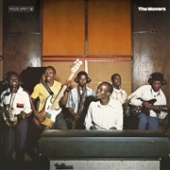
Movers
Vol. 1 - 1970-1976
Label: Analog Africa
Genre: Freestyle / Nu Jazz / Funk / Afro
Availability
- LP €30.99 In Stock
The band exploded onto the country's racially-segregated music scene at the dawn of the 1970s with a sound that applied the rolling organ grooves and elastic rhythms of American soul to songs that came straight from the heart of the townships. Rumours of the band started to spread throughout the country and soon the record labels were sending their talent scouts to the Alexandra township to hear it for themselves. The Movers finally signed to Teal Records in 1969, and their first album, 'Crying Guitar,' went on to sell 500,000 copies within the first three months, launching them into the front rank of South African bands. In their first year they went from local sensations to being the first band of black South Africans to have their music cross over to the country's white radio stations. Although the first record was entirely instrumental, The Movers started working with different singers soon after - scoring an early hit with 14 year old vocal prodigy Blondie Makhene - and enriched their sonic palette with horns, extra percussion and various keyboards. Their stylistic range also expanded, incorporating elements of Marabi, Mbaqanga, jazz, funk, and reggae into their soul-steeped sound. But the essence of their music came from the almost telepathic connection of its founding members: the simmering organ of Sankie Chounyane, the laid-back guitar lines of Oupa Hlongwane, the energetic bass grooves of Norman Hlongwane and the simmering rhythms of drummer of Sam Thabo. The band reached their apex in the mid-1970s, and their hit 'Soweto Inn,' sung by Sophie Thapedi, became inseparable from the student revolts that signalled a new resistance to the apartheid government. In 1976, however, their manager was forced out, and their producer started to play a more active role in the band's direction. By the end of the decade there were no original members left. But at their height The Movers were titans of South African soul who left a legacy of over a dozen albums and countless singles of pure groove. On 'The Movers Vol. 1 - 1970-1976,' Analog Africa presents 14 of the finest tracks from the band's undisputed peak.
